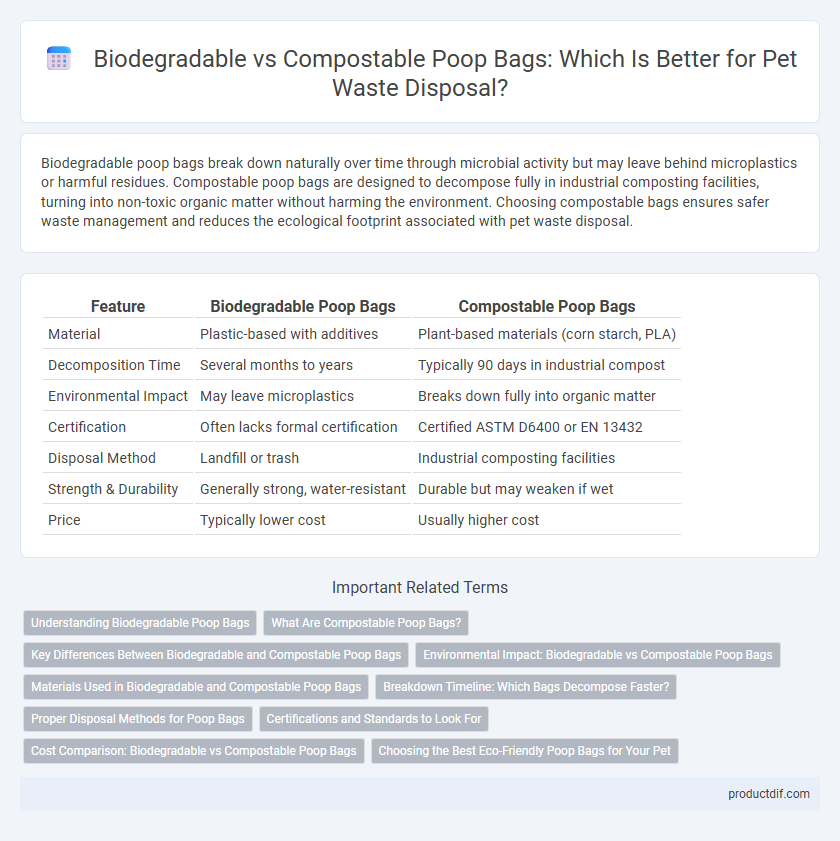Biodegradable poop bags break down naturally over time through microbial activity but may leave behind microplastics or harmful residues. Compostable poop bags are designed to decompose fully in industrial composting facilities, turning into non-toxic organic matter without harming the environment. Choosing compostable bags ensures safer waste management and reduces the ecological footprint associated with pet waste disposal.
Table of Comparison
| Feature | Biodegradable Poop Bags | Compostable Poop Bags |
|---|---|---|
| Material | Plastic-based with additives | Plant-based materials (corn starch, PLA) |
| Decomposition Time | Several months to years | Typically 90 days in industrial compost |
| Environmental Impact | May leave microplastics | Breaks down fully into organic matter |
| Certification | Often lacks formal certification | Certified ASTM D6400 or EN 13432 |
| Disposal Method | Landfill or trash | Industrial composting facilities |
| Strength & Durability | Generally strong, water-resistant | Durable but may weaken if wet |
| Price | Typically lower cost | Usually higher cost |
Understanding Biodegradable Poop Bags
Biodegradable poop bags are designed to break down through natural processes involving bacteria, fungi, or other biological means, typically decomposing in months to years depending on environmental conditions. They often contain materials like plant-based bioplastics or additives to accelerate degradation but may still leave behind microplastics or residues. Understanding their composition and disposal requirements is crucial for minimizing environmental impact and choosing the right solution for eco-conscious pet owners.
What Are Compostable Poop Bags?
Compostable poop bags are designed to break down completely in composting environments, leaving no toxic residue or microplastics behind. Made from plant-based materials like cornstarch, these bags decompose within 90 to 180 days under industrial composting conditions. They provide an eco-friendly alternative to traditional plastic and biodegradable poop bags by supporting soil health and reducing landfill waste.
Key Differences Between Biodegradable and Compostable Poop Bags
Biodegradable poop bags break down naturally over time but may leave behind microplastics or harmful residues, while compostable poop bags decompose fully into non-toxic organic matter within a specific timeframe under industrial composting conditions. Compostable bags are often certified by standards like ASTM D6400 or EN 13432, ensuring complete breakdown without harmful environmental impact. Choosing compostable poop bags supports sustainable waste management by facilitating safe composting, whereas biodegradable bags offer a slower, less predictable degradation process.
Environmental Impact: Biodegradable vs Compostable Poop Bags
Biodegradable poop bags break down into smaller pieces over time but may leave microplastics, posing environmental risks. Compostable poop bags dissolve fully in industrial composting facilities, converting into non-toxic organic matter that enriches soil. Choosing compostable bags significantly reduces pollution and supports sustainable waste management in pet care.
Materials Used in Biodegradable and Compostable Poop Bags
Biodegradable poop bags are typically made from a blend of conventional plastics and additives that promote breakdown under specific environmental conditions, but they may leave microplastic residues. Compostable poop bags are crafted from plant-based materials such as cornstarch, PLA (polylactic acid), or other biopolymers designed to fully decompose into non-toxic components in industrial composting facilities. The choice of materials directly affects environmental impact, with compostable bags offering a more sustainable option due to their natural origins and ability to biodegrade without harmful residues.
Breakdown Timeline: Which Bags Decompose Faster?
Biodegradable poop bags typically begin breaking down within a few months but can take up to several years to fully decompose depending on environmental conditions. Compostable poop bags, certified to meet strict composting standards like ASTM D6400, decompose much faster, often within 90 to 180 days in commercial composting facilities. Choosing compostable bags ensures quicker breakdown and reduced environmental impact compared to standard biodegradable options.
Proper Disposal Methods for Poop Bags
Proper disposal methods for biodegradable poop bags involve placing them in regular trash bins, as they break down under industrial landfill conditions but may not decompose effectively in home composts. Compostable poop bags require industrial composting facilities that provide high heat and specific microbial environments to fully degrade without leaving harmful residues. Ensuring the correct disposal based on the bag type helps reduce environmental impact and supports sustainable pet waste management.
Certifications and Standards to Look For
Biodegradable poop bags typically meet ASTM D6400 or EN 13432 certification standards, which ensure they break down under industrial composting conditions. Compostable poop bags adhere to similar certifications but often emphasize compliance with ASTM D6868 or BPI (Biodegradable Products Institute) standards, guaranteeing safe composting in both home and commercial settings. When choosing eco-friendly pet waste bags, look for certifications like OK Compost, TUV Austria, and the Seedling logo, which confirm the environmental claims and appropriate decomposition processes.
Cost Comparison: Biodegradable vs Compostable Poop Bags
Biodegradable poop bags often come at a lower upfront cost compared to compostable poop bags, making them appealing for budget-conscious pet owners. Compostable poop bags, certified to break down into non-toxic components under industrial composting conditions, usually have a higher price point due to stricter material standards. Long-term savings may favor compostable options as they reduce environmental impact and comply with eco-friendly disposal programs, which can avoid potential fines or additional waste management fees.
Choosing the Best Eco-Friendly Poop Bags for Your Pet
Biodegradable poop bags break down through natural processes but may require industrial composting conditions, while compostable poop bags are specifically designed to decompose in commercial composting facilities into non-toxic components. When choosing the best eco-friendly poop bags, prioritize certified compostable options made from plant-based materials like cornstarch or PLA, ensuring full breakdown without harmful residue. Consider factors such as bag strength for pet waste containment, compatibility with local waste management systems, and certifications like ASTM D6400 or EN 13432 for environmental compliance.
Biodegradable poop bags vs compostable poop bags Infographic

 productdif.com
productdif.com